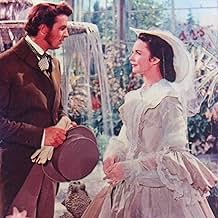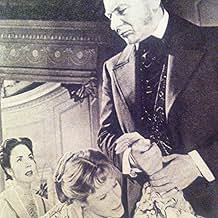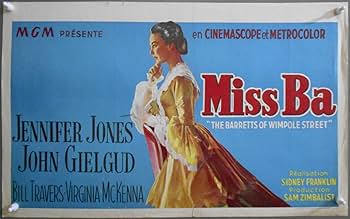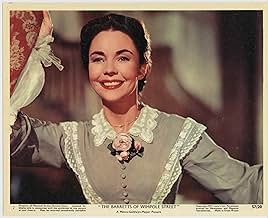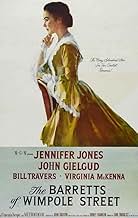PUNTUACIÓN EN IMDb
6,5/10
620
TU PUNTUACIÓN
Añade un argumento en tu idiomaElizabeth Barrett's tyrannical father has forbidden any of his family to marry. Nevertheless, Elizabeth falls in love with the poet Robert Browning.Elizabeth Barrett's tyrannical father has forbidden any of his family to marry. Nevertheless, Elizabeth falls in love with the poet Robert Browning.Elizabeth Barrett's tyrannical father has forbidden any of his family to marry. Nevertheless, Elizabeth falls in love with the poet Robert Browning.
- Dirección
- Guión
- Reparto principal
Christopher Cooke
- Minor Role
- (sin acreditar)
Reseñas destacadas
1957's 'The Barretts of Wimpole Street' is not the first version of Rudolf Beiser's stage play or the real life romance of Elizabeth Barrett and Robert Browning. There is also the 1934 film, seen two years ago, with Fredric March, Norma Shearer and Charles Laughton and aslso directed by Sidney Franklin, which is on the whole a great film especially the performances of Shearer and Laughton (March and the overlength being the weak links). Despite being nervous about it being an extremely close remake, it was still seen anyway because of the story and for the wonderful Sir John Gielgud.
Actually found this a well worth watching and worthy remake, or more other version, and it fares better than quite a lot of them. The reason why there was apprehension about this is due to having seen some very close, word for word, shot for shot remakes that are abysmally executed, a very strong example being 1998's 'Psycho', and was really hoping that it would not be on that level. Thankfully it's not and it didn't feel completely pointless, as there is enough for it to stand on its own and a lot works on its own merits. The earlier film is the superior film definitely in my view, but this version of 'The Barretts of Wimpole Street' shouldn't immediately be written off.
'The Barretts of Wimpole Street' isn't perfect. It does drag at times, the original did do as well but not as significantly, especially in the final act which feels over stretched and lacks tension.
Did feel too that it does focus a little too much on the romance, which isn't as intriguing or as atmospheric as the father and daughter relationship (which was always more interesting before) and it is here where some over faithfulness is apparent. That Bill Travers is on the bland side at times doesn't help.
However, there are a lot of things done right. It is very sumptuously and atmospherically made and doesn't feel too stagy. Jones looks absolutely beautiful in her costumes. Bronislau Kaper's score is haunting and lusciously scored without being too melodramatic. Franklin gives direction as polished, as sensitive and as distinguished as other works of his and throughout 'The Barretts of Wimpole Street' is written with great intelligence and dignity. It doesn't suffer from being too talky like other play-to-film adaptations did at the time and the story remains gripping and didn't feel draggy or creaky mostly.
Especially in the father and daughter relationship which effectively gives one the shivers and has some real intensity. Travers and Jones do have some nice subtle chemistry but it doesn't have the same impact as the chemistry between Jones and Gielgud. The supporting cast are solid and Jones gives a nuanced, deeply felt performance (didn't think her pallid at all), but the acting honours go to Gielgud at his most sinister as a monster of a character.
In summary, well worth watching and worthy. 7/10.
Actually found this a well worth watching and worthy remake, or more other version, and it fares better than quite a lot of them. The reason why there was apprehension about this is due to having seen some very close, word for word, shot for shot remakes that are abysmally executed, a very strong example being 1998's 'Psycho', and was really hoping that it would not be on that level. Thankfully it's not and it didn't feel completely pointless, as there is enough for it to stand on its own and a lot works on its own merits. The earlier film is the superior film definitely in my view, but this version of 'The Barretts of Wimpole Street' shouldn't immediately be written off.
'The Barretts of Wimpole Street' isn't perfect. It does drag at times, the original did do as well but not as significantly, especially in the final act which feels over stretched and lacks tension.
Did feel too that it does focus a little too much on the romance, which isn't as intriguing or as atmospheric as the father and daughter relationship (which was always more interesting before) and it is here where some over faithfulness is apparent. That Bill Travers is on the bland side at times doesn't help.
However, there are a lot of things done right. It is very sumptuously and atmospherically made and doesn't feel too stagy. Jones looks absolutely beautiful in her costumes. Bronislau Kaper's score is haunting and lusciously scored without being too melodramatic. Franklin gives direction as polished, as sensitive and as distinguished as other works of his and throughout 'The Barretts of Wimpole Street' is written with great intelligence and dignity. It doesn't suffer from being too talky like other play-to-film adaptations did at the time and the story remains gripping and didn't feel draggy or creaky mostly.
Especially in the father and daughter relationship which effectively gives one the shivers and has some real intensity. Travers and Jones do have some nice subtle chemistry but it doesn't have the same impact as the chemistry between Jones and Gielgud. The supporting cast are solid and Jones gives a nuanced, deeply felt performance (didn't think her pallid at all), but the acting honours go to Gielgud at his most sinister as a monster of a character.
In summary, well worth watching and worthy. 7/10.
This version of The Barretts Of Wimpole Street lacks for nothing, it's certainly an improvement over the 1934 version in a technical sense with the wide screen and color. It even has the same musical theme that Herbert Stothart wrote for the earlier version that starred Norma Shearer, Fredric March and Charles Laughton.
Jennifer Jones was following in some mighty big footsteps in portraying Elizabeth Barrett. Not only Norma Shearer's, but Katherine Cornell who originated the role in the original Broadway production in 1931 which ran for 370 performances in those Depression years. That is something that should tell you more than anything else about how good this play is. Jen creates her own sense of intelligent regal beauty as the frail poetess who summons up the courage and strength to stand up to her tyrannical father.
Charles Laughton was widely quoted as saying that in his portrayal of the issue ridden Moulton Barrett, the censors couldn't censor the gleam in his eye to get past the Code. The Code by 1957 was cracking and John Gielgud used a couple of direct physical moves rather than camera closeups to show his incestuous feelings for his daughter. Gielgud still gives a fine account of himself, though Mr. Laughton set the standard for that role. On stage it was originated by Charles Waldron who moviegoers will best remember from his last part as General Sternwood in The Big Sleep.
Bill Travers plays a somewhat different Robert Browning than Brian Aherne on stage and Fredric March on the screen. Both of those men are refined types and Browning is a bit more boisterous in this film than he was in the previous one. Still he's ready to do right by Jones and take her from the tyranny she lives under.
Though the 1934 film is an MGM classic, none of the people associated with this version have anything to be ashamed about. This is a story that could be made today. I can see the casting already, Hugh Grant as Robert Browning, Kate Winslet as Elizabeth Barrett, and Tom Wilkinson as Moulton.
I'd pay for a ticket to that. Until then we have two very good classic screen versions.
Jennifer Jones was following in some mighty big footsteps in portraying Elizabeth Barrett. Not only Norma Shearer's, but Katherine Cornell who originated the role in the original Broadway production in 1931 which ran for 370 performances in those Depression years. That is something that should tell you more than anything else about how good this play is. Jen creates her own sense of intelligent regal beauty as the frail poetess who summons up the courage and strength to stand up to her tyrannical father.
Charles Laughton was widely quoted as saying that in his portrayal of the issue ridden Moulton Barrett, the censors couldn't censor the gleam in his eye to get past the Code. The Code by 1957 was cracking and John Gielgud used a couple of direct physical moves rather than camera closeups to show his incestuous feelings for his daughter. Gielgud still gives a fine account of himself, though Mr. Laughton set the standard for that role. On stage it was originated by Charles Waldron who moviegoers will best remember from his last part as General Sternwood in The Big Sleep.
Bill Travers plays a somewhat different Robert Browning than Brian Aherne on stage and Fredric March on the screen. Both of those men are refined types and Browning is a bit more boisterous in this film than he was in the previous one. Still he's ready to do right by Jones and take her from the tyranny she lives under.
Though the 1934 film is an MGM classic, none of the people associated with this version have anything to be ashamed about. This is a story that could be made today. I can see the casting already, Hugh Grant as Robert Browning, Kate Winslet as Elizabeth Barrett, and Tom Wilkinson as Moulton.
I'd pay for a ticket to that. Until then we have two very good classic screen versions.
I've never seen the 1934 version, so I have nothing to compare with, but John Gielgud was sufficiently overbearing, cold, and creepy in the 1957 The Barretts of Wimpole Street for me to not even want to rent the original. There's an undercurrent of incest when he exerts control over his daughter, so it was probably a risk for him to take the role.
It was not a risk, however, for Jennifer Jones to take on Elizabeth Barrett. She's the queen of melodrama (the predecessor of Susan Hayward) and often has characters who get sick or die in her films. In this one, Jonesie is an invalid and meekly submits to all her father's wishes - until one day she meets the energetic, magnetic Robert Browning (played by Bill Travers). They write each other beautiful letters and fall in love, but she fears they can never overtake her father. It's a classic melodrama and shows off her great training as a heavy dramatic actress.
Young Virginia McKenna nearly steals the show as Jonesie's younger, fiery sister who occasionally has the guts to stand up to their father. They're both clad in beautiful period gowns, and Virginia has a fresh-faced sweetness mixed spunk that reminded me of Katharine Hepburn in Alice Adams. Plus it's really cute to see her act with her husband when they're not paired up as love interests. There aren't any Born Free sparks between them; it's called acting, and Virginia lets Bill romance her onscreen sister.
It was not a risk, however, for Jennifer Jones to take on Elizabeth Barrett. She's the queen of melodrama (the predecessor of Susan Hayward) and often has characters who get sick or die in her films. In this one, Jonesie is an invalid and meekly submits to all her father's wishes - until one day she meets the energetic, magnetic Robert Browning (played by Bill Travers). They write each other beautiful letters and fall in love, but she fears they can never overtake her father. It's a classic melodrama and shows off her great training as a heavy dramatic actress.
Young Virginia McKenna nearly steals the show as Jonesie's younger, fiery sister who occasionally has the guts to stand up to their father. They're both clad in beautiful period gowns, and Virginia has a fresh-faced sweetness mixed spunk that reminded me of Katharine Hepburn in Alice Adams. Plus it's really cute to see her act with her husband when they're not paired up as love interests. There aren't any Born Free sparks between them; it's called acting, and Virginia lets Bill romance her onscreen sister.
Throughout this film, I kept thinking of Director Wm. Wyler's adaptation of Henry James's novel, with Olivia de Havilland in "The Heiress." What made that a better movie? was it the casting? the directing? the actor chemistry? or all of the above? Previous reviewers of "Barretts" all praised Gielgud's acting, but I wondered why he accepted the role, or could stand himself in it. I could barely view him on screen, so wooden, so inhuman was his incarnation of Moulton Barrett: this was not a person, it was a caricature. Compare, instead, Ralph Richardson's interpretation of a similar emotion-starved and pathologically driven father in his love for his daughter.
As for the casting of Bill Travers as Robert Browning, I felt he lacked any subtlety, any "poetry" in his manner, any semblance of an understanding of female psychology or charm, most of all, lacked any chemistry with Jones as Elizabeth. He seemed to be barking all of his lines as if he were on the football field. Can you imagine his role cast instead with, say David Farrar, or one of the Ealing Studio regulars? Fans of Jennifer Jones may still want to sit through this movie to see her conception of the poetess. But when we compare this role with her performance in, say, "Wild at Heart [Driven to Earth]," the great Powell-Pressburger film, or even "Madame Bovary," it falls far short of full realization. In those films, she revealed passion, coyness, charm and geniune fear, gripping us with the emotions of her predicament. As noted by another reviewer, here she appears far too healthy, even too mature (although that would be an accurate estimation of her actual age when she met Browning, according to her biography) to be believable. Of course we can accept some cinematic license -- we don't have to expect that Mimi should actually be consumptive in "La Boheme"--but Jones's conception confused strength of character with bodily health -- her fainting on the stairs was almost a joke, more a sign of her rare weakness as an actress. In fact, one actually felt more pity for her sister, as portrayed by Virginia McKenna, in a lively,deeply felt role, in which we feared for Henrietta's emotional health and future in that stifling household.
So, shall we lay the blame at the foot of the hapless director Sidney Franklin? All the settings, the costumes, even the lovely tune, beautifully sung by Jones at the piano should have offered the right support. The clumsiness of the production is almost encapsulated in that little scene around the piano: when Jennifer sings it (whether or not she herself indeed voiced it), there is lyricism and musicality, and one longs for her to continue, but everyone, namely her brothers, is urged to join in. None of them can really sing, they shout out the melody, drowning Elizabeth's soprano, and the whole scene, at least for this viewer, is ruined. Just like the movie.
Of a possible four ****, I give it my lowest rating one star*.
As for the casting of Bill Travers as Robert Browning, I felt he lacked any subtlety, any "poetry" in his manner, any semblance of an understanding of female psychology or charm, most of all, lacked any chemistry with Jones as Elizabeth. He seemed to be barking all of his lines as if he were on the football field. Can you imagine his role cast instead with, say David Farrar, or one of the Ealing Studio regulars? Fans of Jennifer Jones may still want to sit through this movie to see her conception of the poetess. But when we compare this role with her performance in, say, "Wild at Heart [Driven to Earth]," the great Powell-Pressburger film, or even "Madame Bovary," it falls far short of full realization. In those films, she revealed passion, coyness, charm and geniune fear, gripping us with the emotions of her predicament. As noted by another reviewer, here she appears far too healthy, even too mature (although that would be an accurate estimation of her actual age when she met Browning, according to her biography) to be believable. Of course we can accept some cinematic license -- we don't have to expect that Mimi should actually be consumptive in "La Boheme"--but Jones's conception confused strength of character with bodily health -- her fainting on the stairs was almost a joke, more a sign of her rare weakness as an actress. In fact, one actually felt more pity for her sister, as portrayed by Virginia McKenna, in a lively,deeply felt role, in which we feared for Henrietta's emotional health and future in that stifling household.
So, shall we lay the blame at the foot of the hapless director Sidney Franklin? All the settings, the costumes, even the lovely tune, beautifully sung by Jones at the piano should have offered the right support. The clumsiness of the production is almost encapsulated in that little scene around the piano: when Jennifer sings it (whether or not she herself indeed voiced it), there is lyricism and musicality, and one longs for her to continue, but everyone, namely her brothers, is urged to join in. None of them can really sing, they shout out the melody, drowning Elizabeth's soprano, and the whole scene, at least for this viewer, is ruined. Just like the movie.
Of a possible four ****, I give it my lowest rating one star*.
Being owned by two English cocker spaniels my comments are a bit biased.
This film is intriguing, not just for the overall story but the way Flush, Elizabeth's cocker, was so much integral part of it. Given the 120 line poem that she wrote about Flush it was pleasing to see that Flush was very much a part of the movie.
Sir John Gielgud was a superb actor cast in the role of Elizabeth's tyrannical father. Jennifer Jones performance above par. And of course there was Flush. One very lucky cocker spaniel.
This film is intriguing, not just for the overall story but the way Flush, Elizabeth's cocker, was so much integral part of it. Given the 120 line poem that she wrote about Flush it was pleasing to see that Flush was very much a part of the movie.
Sir John Gielgud was a superb actor cast in the role of Elizabeth's tyrannical father. Jennifer Jones performance above par. And of course there was Flush. One very lucky cocker spaniel.
¿Sabías que...?
- CuriosidadesBill Travers and Virginia McKenna got married in September 1957, after the January 1957 release of this film. Travers plays the role of poet Robert Browning, Elizabeth's love interest, and McKenna plays Henrietta, Elizabeth's younger sister.
- PifiasThe London pillar boxes weren't painted red (as seen) until 1874; before that, they were green.
- ConexionesReferenced in Wogan: Episodio #10.35 (1990)
- Banda sonoraWilt Thou Have My Hand
Music by Herbert Stothart
[Elizabeth and all her siblings sing the song in her bedroom as she plays the piano; theme heard in the score throughout the movie]
Selecciones populares
Inicia sesión para calificar y añadir a tu lista para recibir recomendaciones personalizadas
Detalles
- Fecha de lanzamiento
- Países de origen
- Idioma
- Títulos en diferentes países
- Lo que las paredes ocultan
- Localizaciones del rodaje
- Marylebone Church, Marylebone, Londres, Inglaterra, Reino Unido(wedding sequence)
- Empresa productora
- Ver más compañías en los créditos en IMDbPro
- Duración1 hora 45 minutos
- Relación de aspecto
- 2.55 : 1
Contribuir a esta página
Sugerir un cambio o añadir el contenido que falta

Principal laguna de datos
By what name was Las vírgenes de Wimpole Street (1957) officially released in India in English?
Responde



